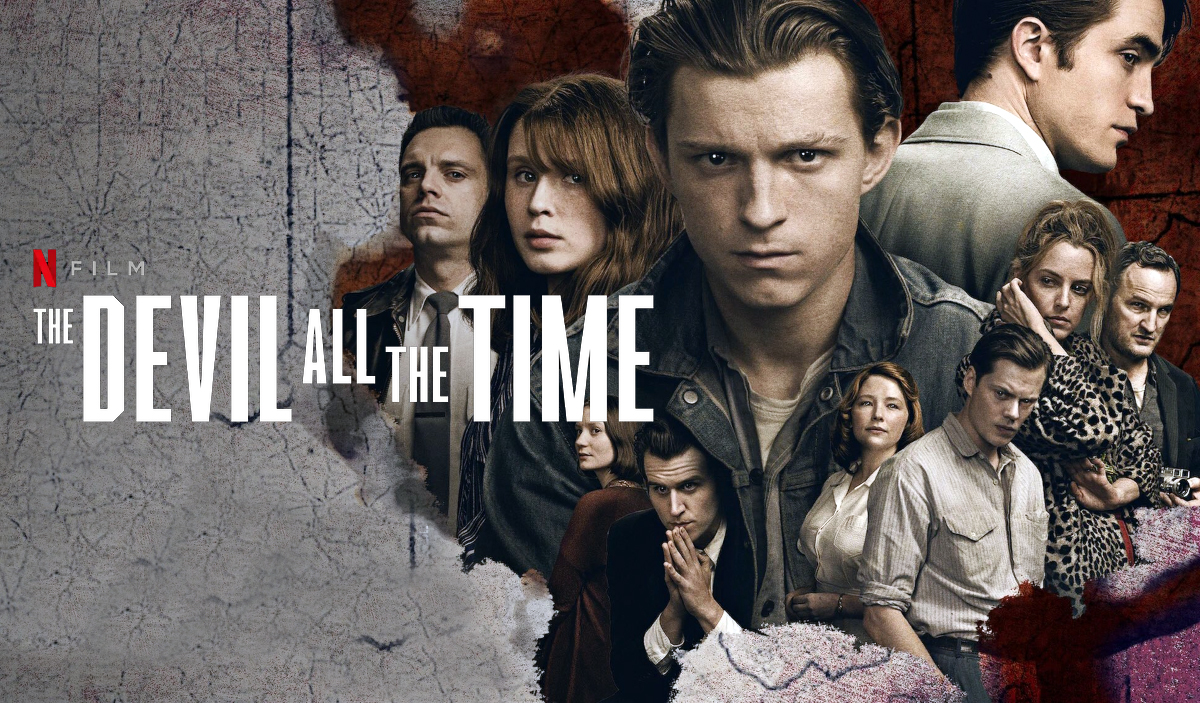The Devil All the Time (2020)

“The Devil All the Time,” directed by Antonio Campos and released in 2020, is a haunting psychological thriller that immerses viewers in the dark undercurrents of American life in the mid-20th century. Adapted from Donald Ray Pollock’s novel of the same name, the film weaves together a tapestry of interconnected stories that explore themes of violence, faith, and the pervasive nature of evil. With a stellar cast that includes Tom Holland, Bill Skarsgård, Robert Pattinson, and Mia Wasikowska, the film offers a chilling examination of human depravity set against the backdrop of the American South.
The narrative unfolds in the fictional town of Knockemstiff, Ohio, where the lives of several characters intertwine in a disturbing exploration of morality and the consequences of trauma. The film primarily follows Arvin Russell (Tom Holland), a young man shaped by the violence and suffering that surrounds him. Following the death of his mother, Arvin is raised by his grandfather, Willard (Bill Skarsgård), a World War II veteran with a dark past. This familial lineage is marked by a cycle of trauma and moral ambiguity that reverberates throughout the film.
The setting itself plays a crucial role in establishing the film’s atmosphere. The rural landscape of Knockemstiff, with its dilapidated homes and oppressive woods, serves as a stark reminder of the struggles faced by its inhabitants. The cinematography, crafted by Lol Crawley, captures both the beauty and bleakness of the region, enhancing the film’s gothic aesthetic. The oppressive sense of foreboding permeates every frame, drawing viewers into a world where danger lurks just beneath the surface.
A notable aspect of “The Devil All the Time” is its ensemble cast, each contributing to the film’s complex narrative. Robert Pattinson delivers a standout performance as Preacher Preston Teagardin, a manipulative and corrupt figure who preys on the vulnerable. Pattinson’s portrayal is unsettling, showcasing a character whose religious facade hides a darker, predatory nature. The film critiques the ways in which faith can be weaponized, exploring the hypocrisy of those who exploit belief for personal gain.

Another significant storyline follows a married couple, Carl and Sandy Henderson (Jason Clarke and Riley Keough), who become embroiled in a series of gruesome murders. Their twisted relationship highlights the depravity that can exist within seemingly ordinary lives. The film does not shy away from graphic violence, using it to emphasize the brutality of their actions and the impact on those around them. This exploration of evil in everyday life serves as a powerful commentary on the darkness that can lurk beneath the surface of society.
The film’s pacing is deliberate, allowing for a slow build of tension as the stories unfold. The nonlinear narrative structure intricately weaves together the various plotlines, creating a rich tapestry that reveals the interconnectedness of its characters. This structure adds depth to the story, as viewers gradually uncover the motivations and backgrounds of each character. The film is as much about the characters’ internal struggles as it is about their external conflicts, emphasizing the psychological weight of their actions.

At its core, “The Devil All the Time” examines the cyclical nature of violence and the impact of generational trauma. The characters are often caught in a web of despair and hopelessness, unable to escape the darkness that surrounds them. Arvin’s journey becomes a quest for understanding and redemption, as he grapples with the legacy of violence that has been passed down to him. The film raises questions about free will and the extent to which one can break free from the sins of the past.
The score, composed by Daniel Hart, complements the film’s tone, blending haunting melodies with unsettling undertones. The music enhances the emotional depth of the narrative, drawing viewers further into the characters’ inner turmoil. It serves as a reminder of the film’s gothic influences, echoing the themes of despair and moral ambiguity that permeate the story.

In conclusion, “The Devil All the Time” is a powerful and unsettling exploration of human nature, morality, and the dark forces that shape our lives. Antonio Campos’s direction, combined with strong performances from a talented cast, creates a chilling and thought-provoking cinematic experience. Through its intricate storytelling and rich character development, the film invites viewers to confront the complexities of evil and the pervasive influence of trauma. As Arvin Russell navigates a world filled with deception and brutality, the film serves as a stark reminder of the struggle between light and darkness within us all. With its haunting atmosphere and profound themes, “The Devil All the Time” stands as a significant contribution to the genre of psychological thrillers, leaving a lasting impression long after the credits roll.











